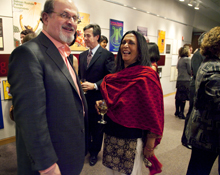Campus News
March 1, 2010
Rushdie opens next chapter

Filmmaker Deepa Mehta (right), who is collaborating with Salman Rushdie (left), was on campus to celebrate the archive opening.
“What you are looking at here,” said Deepika Bahri, curator of the multimedia exhibition “A World Mapped by Stories: The Salman Rushdie Archive,” indicating the author’s words and images displayed in the Schatten Gallery, “is the result of twin acts of trust and care.”
Rushdie has returned to campus for his fourth visit as Distinguished Writer in Residence and to celebrate the opening of his landmark literary collection, placed at Emory’s Manuscripts, Archive, and Rare Book Library in 2006.
The opening of the archive marks a landmark event for scholars and the public, said Director of Emory University Libraries Rick Luce. “This archive includes the most comprehensive digital collection of a major writer ever placed in a research library,” said Luce at the opening reception, attended by Rushdie, his family, and friends filmmaker Deepa Mehta and journalist Christopher Hitchens.
Rushdie thanked the archivists and many others across the University who helped organize what was once boxed in disarray in a storage unit — 100 linear feet of papers, 40,000 files and 18 gigabytes of data on a Mac desktop, three Mac laptops, and an external hard drive. Rushdie, whose fourth novel, “The Satanic Verses,” earned him not only critical acclaim but also death threats from Islamists, has said it will now be easier to craft a new book chronicling his decade of hiding under the fatwa.
“The fatwa was but one chapter in a long and fascinating record of engagement with the world,” said curator Bahri on what she found in Rushdie’s archive. “I saw an elastic mind that wanted to swallow the world, and make it new in stories.”The exhibition, on display through September in the Woodruff Library’s Schatten Gallery, registers Rushdie's interaction with some of the world's leading figures and artists and reflects the author's global vision.
It is “the singular confrontation of the human condition that makes this archive so inexhaustibly rich,” said Luce.
Rushdie’s intellectual contributions to Emory extend to his teaching, lectures and campus dialogues on topics of literary and artistic significance. Joining Rushdie at a Feb. 26 symposium were Hitchens and Mehta, who later spoke on her work making Rushdie’s “Midnight’s Children” into a feature film at the Feb. 28 Sheth Lecture in Indian Studies. Among his other campus activities, Rushdie’s annual public lecture this year will focus on writing for children and the young-at-heart on March 21.
To continue and enhance the libraries’ work in the digital humanities frontier, Luce announced that President Jim Wagner has committed $500,000 toward supporting a born-digital laboratory at the library, and continued development of tools and resources for born-digital and hybrid archives at the University.
“The Rushdie archive provides the raw materials to catalyze such a study,” said Luce.
“The archive, the house of record, is a word that seems to dwell in the past,” said Bahri. “This one promises the future.”
